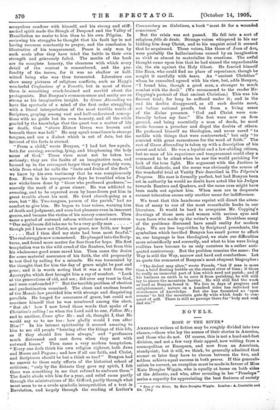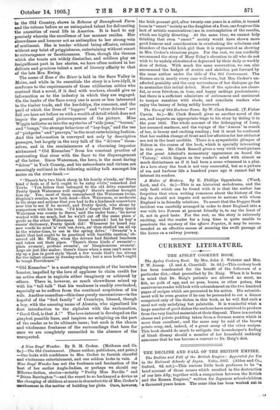AMERICAN writers of fiction may be roughly divided into two
classes,—those who lay the scenes of their stories in America, and those who do not. Of course, this is not a hard-and-fast division, and not a few vary their appeal, now writing from a cosmopolitan or European, and now from an American, standpoint; but it will, we think; be generally admitted that sooner or later they have to choose between the two, and
seldom achieve equal success in both genres. If this generali. cation be correct, an exception must be made in favour of Miss Kate Douglas Wiggin, who is equally at home on both sides of the Atlantic, and who, after revealing in her "Penelope" series a capacity for appreciating the best features of society By Kate Douglas Wiggin. London : A. Constable and
-shrewdness and humour act as antiseptics to her strong vein of sentiment. She is tender without being effusive, reticent without any taint of priggishness, entertaining without resort to extravagance or facetiousness. Thus, though the themes which she treats are widely dissimilar, and soldiers play an insignificant part in her stories, we have often noticed in her -delicate and gracious talent a sort of literary affinity to that -of the late Mrs. Ewing.
The scene of Rose o' the River is laid in the Saco Valley in
Maine, and while in its essentials the story is a love-idyll, it -conforms to the requirements of those utilitarian critics who -contend that a novel, if it deal with workers, should give us information as to the industry in which they are engaged.
-On the banks of the Saco every one is more or less interested in the timber trade, and the hardships, the romance, and the peril of which the lives of " loggers " and "river drivers" are full are here set before us with a wealth of detail which does not Impair the general picturesqueness of the picture. Miss Wiggin initiates us into the mysteries of "side jams," "booms," .and "bungs," the strange behaviour of "key-logs," and the use -of "pickpoles " and "peaveys," in the most entertaining fashion. And this information is conveyed not only by descriptive .passages, but largely in the racy talk of the " drivers " them- selves, and in the reminiscences of a charming impostor nicknamed "Old Kennebec" from his constant practice of -contrasting that river with the Saco to the disparagement
of the latter. Steve Waterman, the hero, is the most daring -"driver" in York County, and his antecedents and virtues are amusingly outlined in the following midday talk amongst his
mates on the river-bank :—
" There's be'n two black sheep in his family a'ready, an' Steve -kind o' feels as if he'd ought to be extry white,' remarked Jed 'Towle. 'You fellers that belonged to the old drive remember Pretty Quick Waterman well enough? Steve's mother brought .him up.' Yes ; most of them remembered the Waterman twins, Stephen's cousins, now both dead—Slow Waterman, so moderate in his steps and actions that you had to fix a landmark somewhere near him to see if he moved; and Pretty Quick, who shone by comparison with his twin. 'Pd kind o' forgot that Pretty Quick Waterman was cousin to Steve,' said the under boss ; 'he never -worked with me much, but he wa'n't cut off the same piece o' goods as the other Watermans. Great hemlock ! but he kep' a oussin' dictionary, Pretty Quick did ! Whenever he heard any .new words he must 'a' writ 'em down, an' then studied 'em all up
• in the winter-time, to use in the spring drive." Swearin"s a .habit that hed ought to be practised with turrible caution,' ob- served old Mr. Wiley, when the drivers had finished luncheon -and taken out their pipes. 'There's three kinds o' swearin'- plain swearin', profane swearin', an' blasphemious swearin'. Logs air jest like mules : there's times when a man can't seem to .rip up a jam in good style 'thout a few words that's too strong for the infant classes in Sunday-schools ; but a man hedn't ought 'to tempt Providence.' "
" Old Kennebec" is a most engaging example of the harmless 'boaster, impelled by the love of applause to claim credit for -an active share in exploits either imaginary or achieved by others. There is, however, so much shrewdness mixed up with his "tall talk" that his weakness is readily overlooked, especially as be suffers from the continual scepticism of his wife. Another comedian—this time purely unconscious—is the .hopeful of the "fool family" of Crambrys, blessed, though „a boy, with the amazing name of Alcestis, who signalised his first introduction to the alphabet with the exclamation, "Good God, is that A!" The love-interest is developed on the -simplest possible lines, and inspires no misgiving on the part -of the reader as to its ultimate issue; but such is the charm aud wholesome freshness of the surroundings that here for once we are completely reconciled to the absence of the unexpected.
A Nine Days' Wonder. By B. M. Croker. (Methuen and Co. 'Cs.)—The Old Cantonment. (Same author, publishers, and price.) —One looks with confidence to Mrs. Croker to furnish cheerful and wholesome entertainment, and one seldom looks in vain. A Nine Days' Wonder has not the freshness and fascination of the 'best of her earlier Anglo-Indian, or perhaps we should say Hiberno-Indian, stories—notably "Pretty Miss Neville" and '"Diana Barrington "—and the resort to so hackneyed a device as the changing of children at nurse is characteristic of Mrs. Croker's oarelessness in the matter of building her plots. Once, however, the Irish peasant girl, after twenty-one years in a cabin, is turned loose in" smart" society as the daughter of a Peer, one forgives this lack of artistic conscientioutases in contemplation of the results, which are highly diverting. At the same time, we cannot help thinking that even "smart" society would have shown more good humour and consideration in overlooking the solecisms and blunders of the wild Irish girl than it is represented as showing in Mrs. Croker's vivacious pages. For the rest, we can cordially recommend the story of Mary Foley's elevation to all who do not wish to be unduly stimulated or depressed by their daily or weekly dose of fiction. With much the same reservation, we can also recommend the budget of stories and sketches put forward by the same author under the title of The Old Cantonment. The themes are in nearly every case well-worn, but Mrs. Croker's un- affected geniality and the easy naturalness of her dialogue go far to neutralise this initial defect. Most of the episodes are cheer- ful, or even frivolous, in tone, and happy endings predominate ; but there is a sufficient admixture of seriousness and sentiment to temper sunshine with shade, and conciliate readers who enjoy the luxury of being mildly harrowed.
The Yarn of Old Harbour Town. By W. Clark Russell. (T. Fisher ITnwin. 6s.)—Mr. Clark Russell gives us another novel of the sea, and imparts an appropriate tinge to his story by dating it in the year 1805. The whole account of the kidnapping of Lucy, her assumed madness, and the voyage of the 'Aurora' in search of her, is breezy and exciting reading ; but it must be confessed that her sudden change of front and her affection for her abductor are not in the least credible. There is a sympathetic glimpse of Nelson in the course of the book, which is specially interesting in this year. Mr. Clark Russell gives a very vivid word-picture of the great Admiral's momentary appearance on board the 'Victory,' which lingers on the reader's mind with almost as much distinctness as if it had been a scene witnessed in a play. As a love story the book is not very successful, but as a picture of sea and harbour life a hundred years ago it cannot fail to interest its readers.
A Maker of History. By E. Phillips Oppenheim. (Ward, Lock, and Co. 6s.)—This is an historical melodrama, and the only fault which can be found with it is that the author has forgotten that when writing romances about the history of the day he should not impute evil motives to nations with whom England is in friendly relations. To assert that the Dogger Bank incident was carefully arranged in order to draw England into a war with two Powers at present friendly is, to say the least of it, not in good taste. For the rest, as the story is extremely exciting, and the reader for a long time is quite unable to penetrate the mystery of the affairs Boynton, it may be recom- mended as an effective means of securing the swift passage of the hours on a railway journey.
CURRENT LITERATURE.















































 Previous page
Previous page